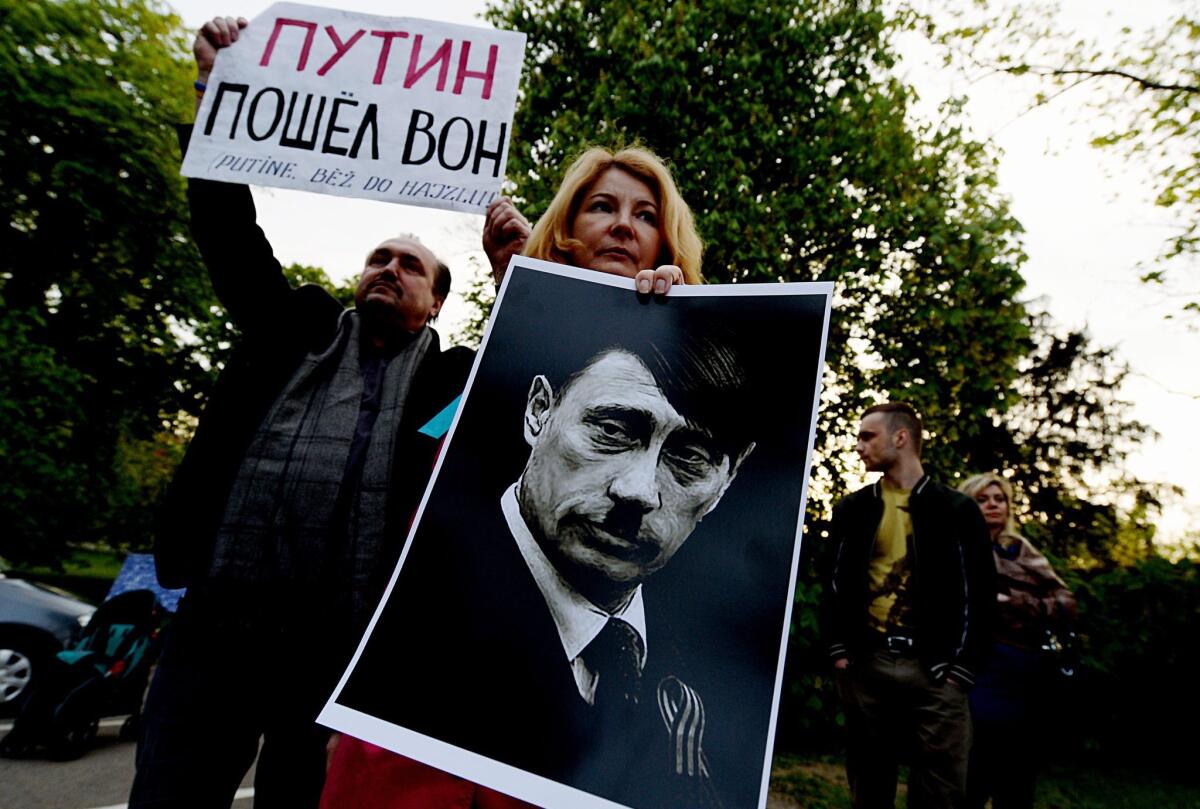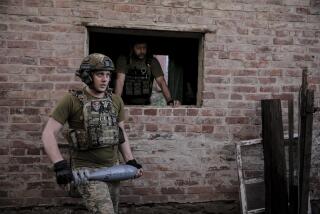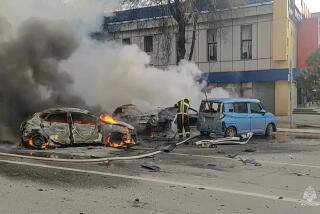Op-Ed: Vladimir Putin’s shopping list: Which country could be next?

- Share via
After Russia’s recent actions in Ukraine, it’s no surprise that other countries bordering Russia are wondering where they stand on Vladimir Putin’s shopping list. That they are on the list is a given.
Article 61 of Russia’s Constitution promises that “the Russian Federation shall guarantee its citizens defense and patronage beyond its boundaries.” In other words, Russia shall protect any Russian citizen who is mistreated while outside Russia.
On its face, Article 61 may seem reasonable. In practice it is toxic, providing legal justification for illegal acts outside Russia’s borders. Article 61 is reminiscent of the Soviet Union’s infamous Article 58, which forbade “counter-revolutionary action” within and outside the Soviet Union.
Article 61 contains no due process standards. Neither does it utilize international dispute resolution tools. In today’s Russia, if Vladimir Putin wishes to take action, he does so.
But at what point does Article 61’s guarantee stop? If an amorous Russian student is slapped by a Ukrainian lass, will Russian tanks roll into Kiev? For that matter, if Russian citizens in Santa Monica complain about a lack of affordable housing, should we expect Russian spetsnaz forces to take over Santa Monica’s City Hall and hold gunpoint elections to decide whether Santa Monica should join the Russian Federation?
Article 61 invites reduction into absurdity. But, in the real world, Russia’s attack on Georgia and its annexation of Crimea have, with an Alice in Wonderland logic, turned the absurdity of Article 61 into the reality of Russian tanks and soldiers invading a neighboring country.
Emulating Hitler and Stalin, Putin justifies his aggression in Georgia and Ukraine by asserting Article 61’s mandate to protect Russian citizens. According to Russian Foreign Minister Sergei Lavrov, “We are talking here about protection of our citizens and compatriots, about protection of the most fundamental of the human rights — the right to live — and nothing more.”
But for the names, the Russian and Nazi justifications for their respective actions in Czechoslovakia and Ukraine are indistinguishable. “For months the Germans in Sudetenland have been suffering under the torture of the Czechoslovak government,” Hitler said in a 1938 speech. “The Sudeten German population was and is a German [population]. This German minority living there has been ill-treated in the most distressing manner.”
Lavrov has failed to cite specific examples of how “the right to live” was violated in Ukraine, perhaps because the image he creates of Russians living in virtual concentration camps is belied by the fact that there has been no stream of refugees fleeing Ukraine to seek safety in Russia. Neither, to our knowledge, have Ukraine’s Russian speakers been seeking political asylum in Russia or any other country. Article 61 is an excuse.
Absent effective, proactive measures by the European Union and its national components, as well as by NATO and the United States, Putin will continue to cite Article 61 and use provocateurs to stir the waters as he tries to restore the Soviet Empire country by country.
For many who reside in the former Soviet republics — Eastern Europe and the Baltic states of Estonia, Latvia and Lithuania —the tragedy unfolding in Ukraine is a nightmare that they’d hoped the fall of the Soviet Union had removed. They recall the mass deportations, killings and economic deprivations that took place under Soviet rule. They, and we, in the 21st century are witnessing an attempt to reinstitute 18th and 19th century colonialism.
During the course of the Russian Revolution and the civil war that ensued, the czarist empire disintegrated. Ukrainians, Georgians, Armenians, Estonians, Latvians, Lithuanians — the people living in each of the czar’s colonies declared their independence. But as the Bolsheviks consolidated power, each of these newly independent countries was forcibly reunited with Russia, this time as part of the Soviet empire. Only Finland and the Baltic states escaped the Soviet Union’s immediate embrace.
Twenty-years later, Finland’s valiant fight against Soviet troops in the Winter War helped it maintain a precarious independence that gave rise to the term “Finlandization.”
The Baltic states were less fortunate. As part of a secret deal between Hitler and Stalin, they again became part of the Soviet Union. Putin’s tactical moves in Georgia and Ukraine are strongly reminiscent of Stalin’s tactics in forcibly incorporating Estonia, Latvia and Lithuania into the Soviet Union. Once again, we’ve seen a mass troop buildup on the borders, choreographed requests for protection, the entry of troops and gunpoint elections.
Putin cares no more about the plight of Russians outside Russia than he does for the plight of Russians within Russia. Article 61 simply provides an excuse to the gullible. He will not be stopped by wishful thinking. Concrete action needs to be taken. Only then can we enjoy “peace in our time.”
Jaak Treiman, Juris Bunkis and Daiva Navarrette are honorary consuls for, respectively, Estonia, Latvia and Lithuania.
More to Read
A cure for the common opinion
Get thought-provoking perspectives with our weekly newsletter.
You may occasionally receive promotional content from the Los Angeles Times.










